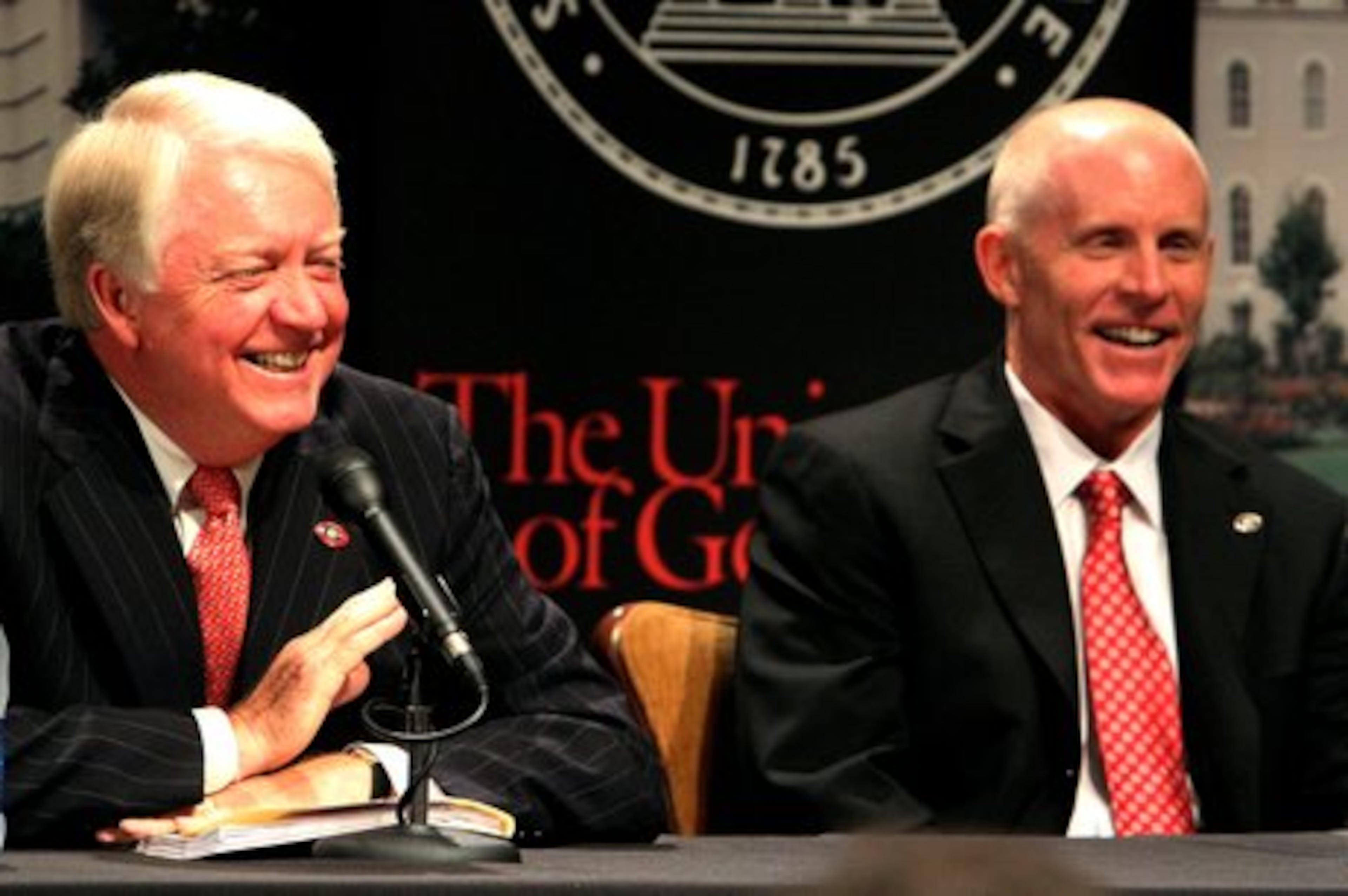She’s the first female head drum major at FAMU, and she’s from metro Atlanta

TALLAHASSEE, Fla. — The Marching 100 band doesn’t just exit the field after halftime at Florida A&M University on Homecoming Day. They “bring it off” in a highly choreographed processional that culminates with each drum major and the entire tuba section jumping into half-splits on the turf.
This performance, like every other, starts and ends under the whistle of the head drum major. And for the first time in the Marching 100’s nearly 80-year history, the whistle was around the neck of a woman who had spent weeks perfecting her solo.
With thousands of eyes fixed on her, she swung the orange and green cape of her uniform. Moments later, she bent her knee in a quiet tribute to her family, sprinted down the field and leaped into the air.
As the crowd roared with delight, an announcer narrated the moment:
And now, ladies and gentlemen, bringing down the tubas: our head drum major. First female head drum major in FAMU history. She’s from Atlanta by way of Nigeria. Put your hands together for Oluwamodupe Oloyede.
The cheers grew even louder.
The right touch
Oloyede, whose first name is often shortened to “Dupe,” began playing music in middle school and attended Southwest DeKalb High School, where she served as head drum major before graduating in 2021.
The 22-year-old theater major will graduate in December and aspires to attend Yale University — where she hopes to receive a master’s degree in musical theater as a triple threat who sings, dances and plays the alto saxophone.
But first, she must get through her final semester as a student and leader of the school’s most storied institution, the 340-member Marching 100. She calls it “positive pressure,” because she feels the weight of the title while also considering it a privilege.
“This season has taught me that I can’t be anybody else’s version of a head drum major,” she said. “The reason I think that God put me here is because I understand the standards, I’ve exemplified them, and now it’s time to serve the band program that served me for so long.”
Shelby Chipman, FAMU’s director of bands, said it was an easy decision to make Oloyede leader. He knew he could trust her to carry out his vision and that she would have the right touch with rank-and-file members.
“She’s fiery when she needs to be fiery, and when she needs to be a little bit more tender, she can be that too,” Chipman said. “And that’s what we need to have in a band like this, where you have 340 students from all over the country with different backgrounds, different economic situations that they’re dealing with and certainly the ethnicity in the band is quite diverse.”
The fall marching season started off for Oloyede with a whirlwind of performances in Houston, New York City and Miami. Amid those high notes, there was a personal loss. She flew home to Lithonia to bury her father who died after an illness.
“It was very humbling,” she said recently. “Life happens: life and death, joy and pain, are happening at the same time. It was a lot of grief conjoined at the same time.”
With her family’s blessing, she did not miss a single performance.
She is just like a celebrity
At many historically Black colleges and universities like FAMU, the marching band is as popular on campus as the football team.
As head drum major, Oloyede is something of a celebrity on campus. People might not know her name, but they recognized her face from the many times she has already gone viral on social media as the first female to hold the title in such a well-known program.
Walking across campus to band practice, she is often stopped by strangers.
Are you the drum major? You were so good. We enjoyed seeing you. Tell me your name again. You mind if I get a picture with you? She is just like a celebrity!
Since she was announced as head drum major over the summer, Oloyede has been thoughtful about how she wants to present herself. One of her goals is to show the young female musicians that they don’t have to abandon their femininity while still honoring traditions that require band members, especially the drum majors, to be uniform on the field.
“A lot of old Rattlers will say there’s no girls in the 100, and what they mean by that is they shouldn’t see any weakness or shifting in the concept. What that can also mean for some women is that we can’t show any femininity, and that’s not the case.”

For Oloyede, that means wearing heels and sometimes dresses to events away from the field.
Passing the torch
It is a long way from the band’s genesis in 1946 with only male performers. Five years later, Norma Solomon White became the first woman to join the FAMU band. She was not allowed to perform at halftime shows; she could only play her baritone during selections in the stands.
White and other women who joined the band at that time where relegated to holding props at halftime — she was once the Statue of Liberty. It would be more than two decades later, around the time that Title IX began calling for gender equity in 1972, that women would be allowed to perform with the Marching 100.
Almost 50 years passed before FAMU would name its first female drum major. Another Southwest DeKalb High School alum, Cori Bostic, broke that glass ceiling in 2018. Intense scrutiny followed after she was chosen to lead; on the internet, from band alumni, from fellow students who sometimes were doubtful a woman could measure up in such a visible role.
“It was a lot of pressure to be perfect,” Bostic said.
But she kept her head down and tried to shut out the noise, keeping in mind that there were hopefully more female drum majors to come, including Oloyede.
“Wearing heels was even a fight for me,” Bostic said. “So, seeing Dupe on the first day as head drum major, introducing herself to the band in a dress, in heels — that’s showing me that she’s being authentically herself.”
During Homecoming Week, a bench on campus was dedicated to White and the band performed at a celebration in her honor. She posed for a photo with Oloyede smiling behind her.
Watching the band’s evolution has been gratifying, White said.
“To think that from 1951 until now, we have a girl who’s head drum major: that is so exciting,” White said. “And it shows how our world has changed.”

A new tradition
Metro Atlanta has always been a major feeder to FAMU, and especially for the band. Although current Marching 100 band members include graduates from Parkview High in Gwinnett County and South Cobb High, the biggest contingent is usually from Southwest DeKalb.
That includes head drum major Oloyede, as well as the current band president and the student assistant to the director. It is the first year that the top three Marching 100 leaders are women, and it just so happens they also represent Atlanta and were drum majors in high school.
That strong Southwest DeKalb to Marching 100 pipeline is less of a coincidence than by design. The current band director at Southwest DeKalb, James Seda, is a former member of the Marching 100. So was his predecessor, Don Roberts, who later became the countywide music director. It was Robert’s vision, influenced by what he learned at FAMU, that shaped Southwest DeKalb’s band.
Oloyede said the feeder tradition benefits both schools.
“Southwest DeKalb is such a training ground because of the standard of excellence,” she said. “As a school, the motto is, ‘Embrace the tradition.’ It’s like a beautiful cycle: Florida A&M University makes great educators, and then they go to Southwest DeKalb.”
Southwest DeKalb’s band also has a legacy of women in leadership, including naming its first female drum major, Talya Sheppard Peters, in the late 1990s. Oloyede was the third woman to be named head drum major after JoAnna Nash and Ariana Montgomery.
“Growing up in Atlanta, Georgia, all we see are boss women running the enterprise,” Oloyede said. “So, when people will say, ‘Girls can’t do this and girls can’t do that,’ I’m like, what do you mean? I was raised to say you can do whatever you set your mind to.”




